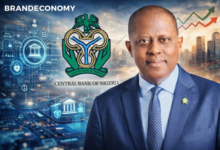Nigeria-Bashing: How to Shame Kemi Badenoch
“I grew up in a poor country and watched my relatively wealthy family become poorer and poorer..."


By Nnanke Harry Willie
Nigeria is undoubtedly blessed with a treasure trove of human and natural resources. Kemi Badenoch is one of those special breeds that has put Nigeria on the map. She has, however, been in the eye of the storm not because of personal achievements but rather because of her hard-hitting comments against Nigeria. This piece attempts to present her story and how her ‘expose’ could eventually be the challenge and opportunity that can make Nigeria great again!
Kemi Badenoch is a Nigerian. She is also British by way of her citizenship status after migrating to the United Kingdom at the age of 16. Today, she is the leader of the UK Conservative Party. This should ideally bring joy and bragging rights to Nigerians and the Nigerian government, the same way Rishi Sunak’s rise did for Indians and the Indian government. Unfortunately, Nigerians are not in a celebratory mood!
Badenoch in Nigeria to strengthen Nigeria-UK efforts at unlocking new investment
In the build-up to campaigning for the coveted position of leader of the Conservative Party, Kemi Badenoch ignited a firestorm of controversy with her comments about her Nigeria, her country of origin. Her remarks, which have been described as vitriolic and denigrating, reflect a complex relationship with her homeland that has drawn both criticism and support from various quarters.
Background to Kemi Badenoch’s Complaints About Nigeria
Badenoch’s criticisms of Nigeria are not new. During her campaign to become the leader of the Conservative Party, she characterized Nigeria as a “socialist nation” rife with corruption and incompetent governance. She recounted personal experiences that shaped her views, including instances where she claimed Nigerian police robbed her family, and described her childhood in Nigeria as filled with fear and insecurity due to rampant corruption and instability
In a recent speech, she reiterated her concerns, stating that she does not want Britain to suffer the same fate as Nigeria under “terrible governments” that destroy lives. Hear her… “And why does this matter so much to me? It’s because I know what it is like to have something and then to lose it,” Badenoch told the audience.
“I don’t want Britain to lose what it has. “I grew up in a poor country and watched my relatively wealthy family become poorer and poorer, despite working harder and harder as their money disappeared with inflation.
“I came back to the UK aged 16 with my father’s last £100 in the hope of a better life. “So I have lived with the consequences of terrible governments that destroy lives, and I never, ever want it to happen here.”
Many Nigerians are happy that Badenoch is using her highly elevated platform to tell Nigeria’s sorry story of underdevelopment to the world. Some others, on the other hand, especially government officials strongly condemn her speeches and are up in arms against what they consider “Nigeria-bashing” from a Nigerian who did not personally experience the horrors and hardships that she has showcased repeatedly.
Continued Vitriol Against Nigeria
However, despite the backlash from Nigerian leaders and citizens alike, Badenoch has remained steadfast in her criticisms. She has distanced herself from the broader Nigerian identity, identifying more closely with her Yoruba ethnicity while disparaging other regions of Nigeria, particularly the North, which she associates with Boko Haram and Islamism. To the shock of many observers, Kemi Badenoch disavowed her Nigerian identity because of her resentment at being associated with northern Nigeria. “Being Yoruba is my true identity,” she said, “and I refuse to be lumped with northern people of Nigeria, who ‘were our ethnic enemies,’ all in the name of being called Nigerian.”
This approach has led to accusations that she is pandering to far-right sentiments in the UK by reinforcing negative stereotypes about Nigeria
A spokesperson for Badenoch emphasized that she is not interested in “laundering Nigeria’s image,” further entrenching her position against what she perceives as systemic failures in her home country
Responses from Nigerians
The reactions to Badenoch’s comments have been polarized. Vice President Kashim Shettima publicly rebuked her for “constantly denigrating” Nigeria, suggesting that if she felt no pride in her heritage, she might consider removing “Kemi” from her name.
Femi Fani-Kayode, a Nigerian politician and British citizen, echoed these sentiments, criticizing Badenoch for her negative portrayal of Nigeria and accusing her of hate towards her homeland
Conversely, some figures like Emeka Umeagbalasi from the International Society for Civil Liberties defended Badenoch’s remarks as a reflection of harsh realities in Nigeria, arguing that acknowledging these issues is essential for progress
Social media has also played a significant role in shaping public discourse around Badenoch’s comments. Many Nigerians have taken to platforms like Twitter and Facebook to express their outrage or support for her statements, highlighting a deep divide in perceptions of national identity and governance issues within Nigeria
A Call for Reform
Rather than viewing Kemi Badenoch’s criticisms solely as an attack on Nigeria, they can be interpreted as a clarion call for urgent reforms across various sectors:
Reduce Poverty: Implement comprehensive economic policies aimed at poverty alleviation through job creation and social welfare programs.
Improve Security: Address security concerns by enhancing law enforcement capabilities to combat banditry, kidnapping, and insurgency from groups like Boko Haram and ISWAP.
Combat Corruption: Establish stringent measures to reduce systemic corruption within government institutions.
Cut Waste and Stealing of Government Funfs: There is an urgent need to cut the cost of governance across the board. Federal, states and local governments in Nigeria are notorious for inserting nebulous items in their budgets including repeated annual purchase of luxury cars, office renovations, entertainment and bogus numbers of political appointees. There should be an abrupt end to people feeding fat off the resources of the country. The “Monkey dey work, Baboon dey chop syndrome” must end. This is the bane of Nigeria’s underdevelopment. People who wish to live large should become entrepreneurs and establish businesses. A country where the wealthy and super-wealthy class is populated by politicians and bureaucrats is doomed. This unfortunately is where Nigeria finds itself presently.
Enhance Health Services: Invest in healthcare infrastructure to improve access to quality health services for all citizens.
Electoral Reform: Reform electoral laws to prevent manipulation by corrupt politicians and ensure free and fair elections. What is currently obtained is largely survival of the most crooked. Nigerians know it, Kemi Badenoch knows it…the world knows it! Laws must be watertight to ensure strict adherence to transparency and accountability. The harshest punishment should be reserved for election manipulators and riggers.
Reduce Japa (Outward Migration): Create opportunities that encourage Nigerians to remain in the country rather than seek better prospects abroad. Nigeria is already haemorrhaging from losing well-trained professionals (Doctors, Nurses, Tech professionals, etc) to saner climes. It could get worse if we don’t take up the Kemi challenge.
Promote Local Production: Introduce common sense economic reforms to reduce dependency on imports by encouraging local production of essential goods such as food and petroleum products; launch campaigns promoting “Produce, Make, Sell and Buy Nigerian.”
Foster Investment: Create an enabling environment for both local and foreign investors through policy stability, infrastructure development, and tax incentives.
Lead by Example: Leaders at all levels must demonstrate commitment to these reforms through action rather than mere rhetoric. They should do more and say less.
Engage Diaspora Nigerians: The best ambassadors for Nigeria are Nigerians in the diaspora. If the right steps are taken and the we are able to attract our own people, like Kemi Badenoch, diasporan and foreign investments will flow into our economy. Nigerian diasporans are also more likely to return and contribute their talents towards national development.
“Shaming Kemi Badenoch”
Rather than taking it as an affront and bellyache over Kemi Badenoch’s remarks, Nigeria’s leaders and citizens alike should frame it as a challenge and call-to-action. Herein lies another unique opportunity for constructive dialogue, critical thinking, concerted efforts and a set of cohesive actionable policies aimed at fostering meaningful change within Nigeria. Let us show Kemi Badenoch that Nigeria can be great again. May be then our dear Kemi would sing a new song for Nigeria.








